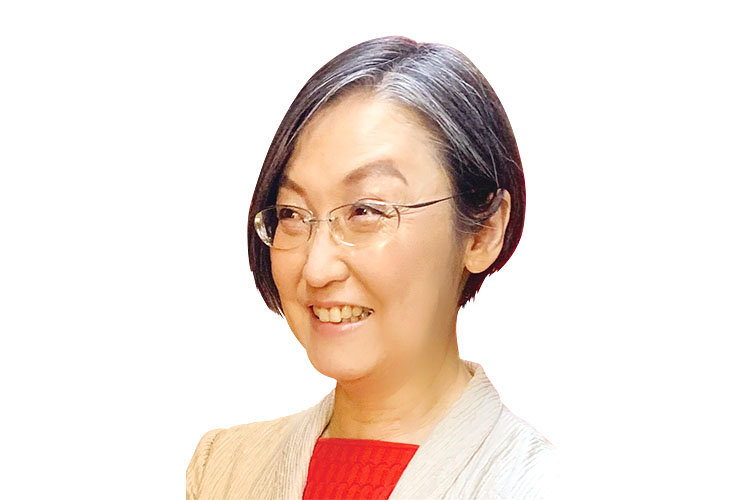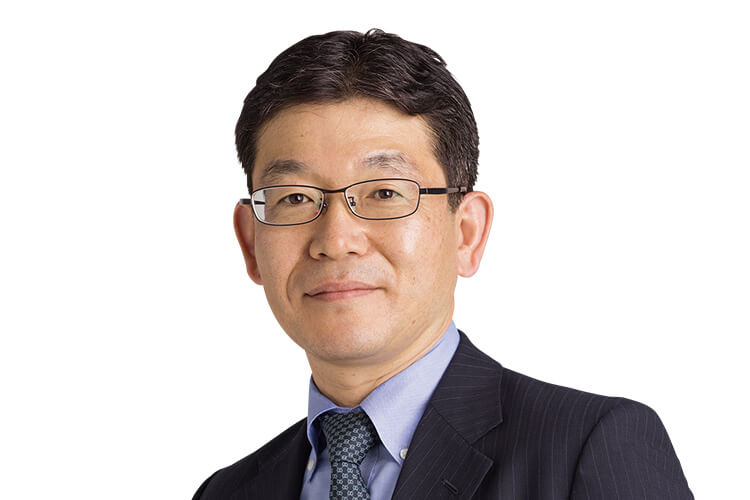Identification processes
Identification processes for major sustainability themes (materiality)
Social issues are derived from economic, social, and environmental perspectives, with reference to SDGs guidelines and UNEP (United Nations Environment Programme) Impact Radar guidelines.
About 180 items were derived as the materiality items, with reference to issues we will work on (about 1,600 items) submitted by the participants (about 300 people) in the SDGs training for managers (May 21 to 28, 2020).
Interviews were conducted with some relevant divisions to derive the issues.
The administrative office deleted items that are not significantly related to our Group, integrated overlapping items, and incorporated a perspective for ESG evaluation items, to narrow down the items to 30 as the office's draft proposal, further aggregating them into 7 structured items.
Conducting a questionnaire among managers (November 19 to 30, 2020)
Exchanging ideas with Corporate Officers (January 7 to 18, 2021)
Interviewing third parties (external experts) (February 15 to 22, 2021)
Comments from external experts
To identify materiality, we held dialogues with external experts who evaluated the validity of the details and gave us many suggestions about what constitutes Nankai's unique character. Based on the views and suggestions, we conducted an internal re-evaluation, reflecting the views and suggestions into the materiality and issues we will work on.
* It is posted with the information at the time of receiving the comment.

Mariko Kawaguchi
Fuji Oil Holdings Inc.
Executive Advisor to CEO
Specially Appointed Professor, Rikkyo University
Areas on which she commented: SDGs and CSR
Solve social issues through railway and community development, with SDGs as the basis
I have a lot of hope for railway companies from an SDGs perspective. First, for Goal 13, which prescribes "Climate action," railways are a method of transport that emit less greenhouse gas than cars and airplanes. I would like you to improve user friendliness to encourage more people to use trains and to promote a modal shift in society. I also hope that you will promote the decarbonization of power (shifting to renewable energy). With respect to measures to respond to climate change, the most pressing issue will be to take measures that enable customers to use trains safely, such as taking measures to avoid transportation failure, including flood response measures amid the frequent abnormalities of climate.
People's lives have completely changed due to COVID-19. How can we provide efficient and comfortable work styles and lifestyles? How can we travel smoothly? Goal 11, which is, "Sustainable cities and communities" needs to be achieved. In doing so, respect for biodiversity and a self-serving energy perspective are also important.
Sustainable development also needs the incorporation of the diversity and inclusion perspectives into business. I hope, with SDGs as the basis, you will set goals that reflect the uniqueness of Nankai and steadily work toward the goals.

Keisuke Takegahara
Development Bank of Japan Inc.
Research Institute of Capital Formation
Executive Fellow
Areas on which he commented: financial institutions, institutional investors
I want you to develop your materiality so that people will know Nankai's unique character
Identifying materiality this time provided a good opportunity to think about key themes for achieving "the 10 years to develop the areas along our railway lines toward the launch of Naniwasuji Line" raised in the Group Management Vision 2027, from the standpoint of your business and its foundation. It covers a wide range of factors that embody the growth strategy that is unified with community development, illustrating the characteristics of your business quite well. Especially excellent is the identification process that involved your many employees and that was carefully worked on, including external evaluation perspectives such as SDGs and an ESG evaluation. In light of ESG finance logic, which calls the factors that define the long-term sustainability of a business model as materiality, the involvement of the employees, who are supporters of business, in the identification process, thereby having them take ownership of the issue, is meaningful and from that standpoint, this approach is excellent. It will also be effective in periodic reviews.
Going forward, I hope that you will advance the materiality so that people will come to know the Nankai's unique character that has grown by improving the value of the areas along your railway lines over the years. There could be many ways to advance the materiality, breaking down the value of the areas along your railway lines that you have developed from the standpoint of how it could solve social issues, and considering the balance between the social and environmental perspectives of materiality, and setting the granularity of its items.

Junko Nagata
Graduate School, Osaka City University
Professor, Graduate School of Urban Management, Urban Policy and Regional Economy
Areas on which she commented: community development, civil society
Hopes for exploring mobility's social meaning and becoming a business
I find this initiative promising, as it seems to incorporate diverse views and cultures in our society, and views for the future, which are interacting with each other, identifying materiality by analyzing its impact on business activities from economic, social, and environmental perspectives for improved SDGs management. I also found the identification process that involved employees in managerial positions to be powerful, as it highlights the commitment of the company as a whole to work together.
However, if you further look into the potential of mobility, such as peace of mind and aesthetics beyond comfort, and whether regional revitalization is only about that region thriving, and how will people actually use the town beyond community development, such thinking could reveal future-oriented materiality. I gave the railway business as an example, but the same goes for the other businesses.
It would also be nice to include expressions that are unique to the Nankai Group. The key is in "active communication with diverse stakeholders," as set forth in the materiality item. I have high hopes for the new initiative that I have heard is in the pipeline, which will "organize the process of creating value" and provide new value by creating a new paradigm in the world of transport.

Yumi Sano
Japan Institute for Women's Empowerment & Diversity Management
Director, Kansai Office
Areas on which she commented: diversity, labor
Set KPI and roadmaps and rotate the PDCA to change awareness and behavior
At companies, a diversity & inclusion mindset is spreading, where diverse attributes (gender, age, and nationality), values and ideas are being adopted to respond to changes in the environment, thereby creating new value to differentiate themselves from others and making it the foundation for management.
The Nankai Group also raises "diversity & inclusion" as a key issue, focusing efforts on responding quickly and flexibly to changing trends and diversifying customer needs.
As a touchstone for diversity, Japan is now progressing initiatives that focus on the career advancement of women, with institutional investors seeing the index of women's career advancement as a factor for investment decisions, hoping that it will bring about innovations and better performance in the long term.
Going forward, companies will be required to set, share and announce KPI and roadmaps both internally and externally for the career advancement of diverse employees, and to rotate the PDCA to change the awareness and behavior of all employees.
I feel that the Nankai Group has a culture to focus particularly on personnel development. I hope that each and every employee will put their individual character and talents to full use and that you will further develop as an organization that brings together the power of all your employees.

Naoki Hatanaka
Architects, Regional Planners & Associates, Kyoto (arpak)
Director, Chief Manager (Sustainability Management) and Director, Nagoya Office
Visiting Teacher, Graduate School of Engineering, Osaka University
(Division of Sustainable Energy and Environmental Engineering)
Areas on which he commented: environment
Work on climate change and decarbonization from both risk and opportunity perspectives
Transformations for sustainability are becoming a pressing issue in every field, including the Paris Agreement that targets zero carbon emissions by around 2050, Japan's carbon neutrality by 2050 that have accelerated with the start of the Biden Administration and with the United States' return to the international community, and SDGs, in order to keep climate change within a 1.5 to 2°C rise as its effects are becoming increasingly evident.
In particular, for the 10 important years up to 2030, it is important to share ambitious goals with stakeholders, such as how to bring transformation to the Nankai Group's wide-ranging businesses, not just in the railway business, but in community development in the areas along your railway lines, and in using forests that you own, converting energy (fossil energy), materials (iron, concrete, and plastic) and solving various regional issues as a socially responsible company, paying attention to the vulnerable (not leaving anyone behind), and also making sure that non-financial value such as history and community are respected.
I hope that you will work on risks and opportunities relating to these issues to lead society in the future as the most historical electric railway company in Japan.
Sustainability Site Map
(materiality)
- Major sustainability themes (materiality)
- Identification processes
- Further seek safety, security, and satisfaction
- Thriving and friendly community development
- Create a future full of dreams
- Achieve an enriched life
- Develop a workplace and staff in a way that enables each person to put their abilities to use
-
Contribute to preserving the global environment
- Environmental philosophy
- Reducing CO2 emissions in response to climate change, promoting the use of renewable energy, and so forth
- Bringing about a circular society
- Preserving biodiversity
- Deepening our environmental management
- Expanding environmental buildings (green buildings)
- Responses to TCFD Recommendations
- Bolster a corporate foundation that is sincere and fair
